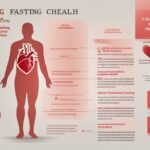Hey there, fellow wellness seekers! If you’ve been curious about the fasting benefits that everyone seems to be raving about, you’re in the right place. Prolonged fasting—going without food for extended periods, typically 24 hours or more—has gained traction as a powerful tool for improving health, boosting mental clarity, and even aiding in weight management. But let’s be real: it’s not a walk in the park. That’s why I’ve put together this comprehensive guide on prolonged fasting tips to help you navigate this journey safely and effectively. Whether you’re a newbie or a seasoned faster, I’ll share practical advice, science-backed insights, and personal tidbits to ensure you reap the incredible rewards of fasting. Let’s dive into how you can unlock the full potential of prolonged fasting while keeping your body and mind in check!
What Is Prolonged Fasting and Why Does It Matter?
Prolonged fasting refers to abstaining from food for an extended duration, often ranging from 24 to 72 hours or even longer under medical supervision. Unlike intermittent fasting, which cycles between short eating and fasting windows, prolonged fasting pushes your body into deeper metabolic states. One of the standout fasting benefits is autophagy—a cellular “clean-up” process where your body recycles damaged cells and regenerates healthier ones (Levine & Kroemer, 2019). This isn’t just a trendy buzzword; it’s a scientifically studied mechanism linked to longevity and disease prevention. Beyond that, prolonged fasting can improve insulin sensitivity, reduce inflammation, and support weight loss by tapping into stored fat for energy (Mattson et al., 2017). But to experience these perks, you need to approach it with caution and preparation, which brings us to the tips I’m excited to share.
Tip 1: Prepare Your Body and Mind for the Fast
Jumping into prolonged fasting without prep is like running a marathon without training—recipe for disaster! One of the first steps to harnessing the health benefits of fasting is easing your body into it. Start by reducing your calorie intake a few days before the fast, focusing on nutrient-dense foods like vegetables, lean proteins, and healthy fats. This helps prevent intense hunger pangs and stabilizes blood sugar levels. Mentally, set clear intentions. Are you fasting for weight loss, mental clarity, or spiritual reasons? Having a “why” keeps you motivated when cravings hit. Also, consult your doctor if you have underlying conditions like diabetes or heart issues, as fasting isn’t suitable for everyone (Johnstone, 2015). Preparation isn’t just physical—it’s about building a mindset to endure and thrive.
- Gradually cut back on processed sugars and carbs 3–5 days before fasting to minimize withdrawal symptoms.
- Hydrate well in advance—aim for at least 8–10 glasses of water daily to preload your system.
- Stock up on electrolytes like sodium, potassium, and magnesium to prevent imbalances during the fast.
- Inform loved ones about your plan so they can support (or at least not tempt you with pizza!).
Tip 2: Stay Hydrated and Support Your Electrolytes
Here’s a non-negotiable when it comes to prolonged fasting: hydration. Water isn’t just a thirst quencher; it’s your lifeline during a fast. Dehydration can sneak up, causing headaches, fatigue, and dizziness—symptoms that’ll make you want to quit. Aim for 2–3 liters of water daily, and don’t shy away from adding a pinch of high-quality sea salt to replenish sodium lost through urine (Institute of Medicine, 2005). Another gem among fasting benefits is how it resets your relationship with hydration and mindfulness around what your body needs. Herbal teas or black coffee (no sugar or cream) can also keep things interesting without breaking the fast. And if you feel woozy, an electrolyte supplement or bone broth (if you’re doing a modified fast) can be a game-changer. Listen to your body—it’s smarter than you think!
Tip 3: Manage Hunger and Energy Dips Strategically
Let’s talk about the elephant in the room: hunger. During prolonged fasting, your body shifts from burning glucose to ketones, a fat-derived energy source, which can take 12–24 hours (Cahill, 2006). This transition often comes with low energy, irritability, or “hanger.” But here’s the good news—there are ways to ride this wave. Distract yourself with light activities like walking or meditation; an idle mind obsesses over food. Also, recognize that hunger often comes in waves and passes within 20–30 minutes. Sip water or chew sugar-free gum to trick your brain. One of the underrated fasting health benefits is learning to differentiate true hunger from boredom or habit. Once you’re in ketosis, many report a surge in mental clarity and reduced appetite, so hang in there!
- Keep busy with non-strenuous tasks like reading or journaling to avoid fixating on food.
- Practice deep breathing exercises to calm hunger-induced stress or anxiety.
- Break your fast gently if symptoms like dizziness or nausea persist—health first!
- Get ample rest; sleep helps reset hunger hormones like ghrelin (Spiegel et al., 2004).
Tip 4: Break Your Fast Thoughtfully to Maximize Benefits
Breaking a prolonged fast isn’t the time to raid the fridge for pizza and ice cream (trust me, I’ve been tempted!). After days of fasting, your digestive system is in a delicate state, and overloading it can cause bloating or worse. Start with small, easily digestible foods like bone broth, avocado, or steamed veggies. Gradually reintroduce proteins and carbs over 24–48 hours. This approach not only prevents discomfort but also sustains the fasting benefits like improved gut health and metabolic flexibility. Research suggests that a slow refeeding phase can help maintain the anti-inflammatory effects of fasting (Longo & Mattson, 2014). So, take it slow, savor each bite, and let your body ease back into eating. It’s a beautiful way to reconnect with food.
Tip 5: Monitor Your Body and Know When to Stop
While the advantages of fasting are impressive, it’s not a one-size-fits-all practice. Pay close attention to how your body responds. Mild fatigue or hunger is normal, but severe symptoms like fainting, heart palpitations, or extreme weakness are red flags. If you experience these, break the fast immediately and seek medical advice. Prolonged fasting isn’t about pushing past your limits—it’s about balance. I’ve learned over time that listening to my body is the ultimate key to reaping fasting health benefits without harm. Keep a journal to track mood, energy, and physical sensations. And remember, fasting is a tool, not a punishment. If it’s not working for you, there are plenty of other ways to boost wellness.
As we wrap up, I hope these prolonged fasting tips have given you a roadmap to explore the incredible fasting benefits safely and sustainably. From preparing your body to breaking the fast with care, each step is about honoring your health and unlocking the potential within. Fasting isn’t just about skipping meals—it’s a journey of self-discovery, resilience, and renewal. Whether you’re aiming for weight loss, better focus, or a cellular reset, approach it with curiosity and caution. Have you tried prolonged fasting before? I’d love to hear your experiences or questions in the comments. Here’s to fasting smarter, not harder, and embracing a healthier, more vibrant you!
References
- Cahill, G. F. (2006). Fuel metabolism in starvation. Annual Review of Nutrition, 26, 1–22. https://doi.org/10.1146/annurev.nutr.26.061505.111258
- Institute of Medicine. (2005). Dietary Reference Intakes for Water, Potassium, Sodium, Chloride, and Sulfate. National Academies Press.
- Johnstone, A. (2015). Fasting for weight loss: An effective strategy or latest dieting trend? International Journal of Obesity, 39(5), 727–733. https://doi.org/10.1038/ijo.2014.214
- Levine, B., & Kroemer, G. (2019). Biological functions of autophagy genes: A disease perspective. Cell, 176(1-2), 11–42. https://doi.org/10.1016/j.cell.2018.09.048
- Longo, V. D., & Mattson, M. P. (2014). Fasting: Molecular mechanisms and clinical applications. Cell Metabolism, 19(2), 181–192. https://doi.org/10.1016/j.cmet.2013.12.008
- Ageing Research Reviews, 39, 46–58. https://doi.org/10.1016/j.arr.2016.10.005






